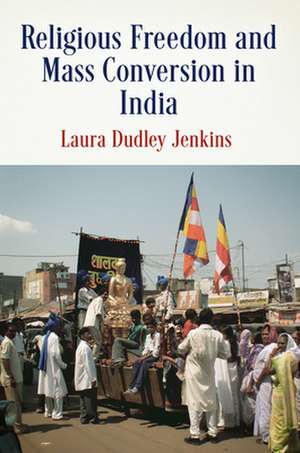Religious Freedom and Mass Conversion in India: Pennsylvania Studies in Human Rights
Autor Laura Dudley Jenkinsen Limba Engleză Hardback – 30 mai 2019
In Religious Freedom and Mass Conversion in India, Laura Dudley Jenkins examines three mass conversion movements in India: among Christians in the 1930s, Dalit Buddhists in the 1950s, and Mizo Jews in the 2000s. Critics of these movements claimed mass converts were victims of overzealous proselytizers promising material benefits, but defenders insisted the converts were individuals choosing to convert for spiritual reasons. Jenkins traces the origins of these opposing arguments to the 1930s and 1940s, when emerging human rights frameworks and early social scientific studies of religion posited an ideal convert: an individual making a purely spiritual choice. However, she observes that India's mass conversions did not adhere to this model and therefore sparked scrutiny of mass converts' individual agency and spiritual sincerity.
Jenkins demonstrates that the preoccupation with converts' agency and sincerity has resulted in significant challenges to religious freedom. One is the proliferation of legislation limiting induced conversions. Another is the restriction of affirmative action rights of low caste people who choose to practice Islam or Christianity. Last, incendiary rumors are intentionally spread of women being converted to Islam via seduction. Religious Freedom and Mass Conversion in India illuminates the ways in which these tactics immobilize potential converts, reinforce damaging assumptions about women, lower castes, and religious minorities, and continue to restrict religious freedom in India today.
Din seria Pennsylvania Studies in Human Rights
-
 Preț: 240.85 lei
Preț: 240.85 lei -
 Preț: 191.81 lei
Preț: 191.81 lei -
 Preț: 243.06 lei
Preț: 243.06 lei -
 Preț: 238.67 lei
Preț: 238.67 lei -
 Preț: 194.09 lei
Preț: 194.09 lei -
 Preț: 352.64 lei
Preț: 352.64 lei -
 Preț: 275.75 lei
Preț: 275.75 lei -
 Preț: 239.77 lei
Preț: 239.77 lei -
 Preț: 198.22 lei
Preț: 198.22 lei -
 Preț: 245.25 lei
Preț: 245.25 lei - 19%
 Preț: 447.55 lei
Preț: 447.55 lei -
 Preț: 325.82 lei
Preț: 325.82 lei -
 Preț: 243.94 lei
Preț: 243.94 lei -
 Preț: 236.48 lei
Preț: 236.48 lei -
 Preț: 241.28 lei
Preț: 241.28 lei -
 Preț: 236.48 lei
Preț: 236.48 lei -
 Preț: 242.51 lei
Preț: 242.51 lei -
 Preț: 238.67 lei
Preț: 238.67 lei -
 Preț: 239.10 lei
Preț: 239.10 lei -
 Preț: 477.33 lei
Preț: 477.33 lei -
 Preț: 237.35 lei
Preț: 237.35 lei - 15%
 Preț: 360.60 lei
Preț: 360.60 lei -
 Preț: 248.30 lei
Preț: 248.30 lei -
 Preț: 413.03 lei
Preț: 413.03 lei -
 Preț: 243.94 lei
Preț: 243.94 lei -
 Preț: 196.55 lei
Preț: 196.55 lei -
 Preț: 243.06 lei
Preț: 243.06 lei -
 Preț: 246.69 lei
Preț: 246.69 lei -
 Preț: 244.14 lei
Preț: 244.14 lei -
 Preț: 197.59 lei
Preț: 197.59 lei -
 Preț: 244.14 lei
Preț: 244.14 lei -
 Preț: 286.76 lei
Preț: 286.76 lei - 23%
 Preț: 538.83 lei
Preț: 538.83 lei -
 Preț: 246.37 lei
Preț: 246.37 lei - 23%
 Preț: 568.45 lei
Preț: 568.45 lei -
 Preț: 193.78 lei
Preț: 193.78 lei -
 Preț: 194.91 lei
Preț: 194.91 lei -
 Preț: 194.09 lei
Preț: 194.09 lei -
 Preț: 443.54 lei
Preț: 443.54 lei -
 Preț: 317.05 lei
Preț: 317.05 lei -
 Preț: 197.18 lei
Preț: 197.18 lei -
 Preț: 432.36 lei
Preț: 432.36 lei - 19%
 Preț: 388.90 lei
Preț: 388.90 lei -
 Preț: 232.04 lei
Preț: 232.04 lei -
 Preț: 313.53 lei
Preț: 313.53 lei -
 Preț: 244.45 lei
Preț: 244.45 lei -
 Preț: 197.18 lei
Preț: 197.18 lei -
 Preț: 292.24 lei
Preț: 292.24 lei -
 Preț: 283.21 lei
Preț: 283.21 lei -
 Preț: 241.28 lei
Preț: 241.28 lei
Preț: 556.10 lei
Preț vechi: 624.83 lei
-11% Nou
Puncte Express: 834
Preț estimativ în valută:
106.44€ • 109.69$ • 89.86£
106.44€ • 109.69$ • 89.86£
Carte tipărită la comandă
Livrare economică 01-15 martie
Preluare comenzi: 021 569.72.76
Specificații
ISBN-13: 9780812250923
ISBN-10: 0812250923
Pagini: 320
Ilustrații: 10 illus.
Dimensiuni: 162 x 237 x 29 mm
Greutate: 0.57 kg
Editura: MT – University of Pennsylvania Press
Seria Pennsylvania Studies in Human Rights
ISBN-10: 0812250923
Pagini: 320
Ilustrații: 10 illus.
Dimensiuni: 162 x 237 x 29 mm
Greutate: 0.57 kg
Editura: MT – University of Pennsylvania Press
Seria Pennsylvania Studies in Human Rights
Cuprins
Introduction: Religious Freedom and the Right to Convert
PART I. MOBILITY
Chapter 1. Mass Movement Christians: Religious and Social Mobility
Chapter 2. Ambedkarite Buddhists: Religious and Political Mobility
Chapter 3. Mizo Jews: Religious and Spatial Mobility
PART II. IMMOBILITY
Chapter 4. Prosecution: Anticonversion Legislation
Chapter 5. Prevention: Losing Affirmative Action
Chapter 6. Persecution: The Love Jihad Rumor
Conclusion. A More Equal Freedom
Notes
Bibliography
Index
Acknowledgments
PART I. MOBILITY
Chapter 1. Mass Movement Christians: Religious and Social Mobility
Chapter 2. Ambedkarite Buddhists: Religious and Political Mobility
Chapter 3. Mizo Jews: Religious and Spatial Mobility
PART II. IMMOBILITY
Chapter 4. Prosecution: Anticonversion Legislation
Chapter 5. Prevention: Losing Affirmative Action
Chapter 6. Persecution: The Love Jihad Rumor
Conclusion. A More Equal Freedom
Notes
Bibliography
Index
Acknowledgments
Descriere
Religious Freedom and Mass Conversion in India argues that, although the right to religious freedom is enshrined in India's constitution, mass conversions to minority religions have complicated the practice of this right, which is increasingly invoked to restrict, rather than defend, the freedoms of minorities and women.
